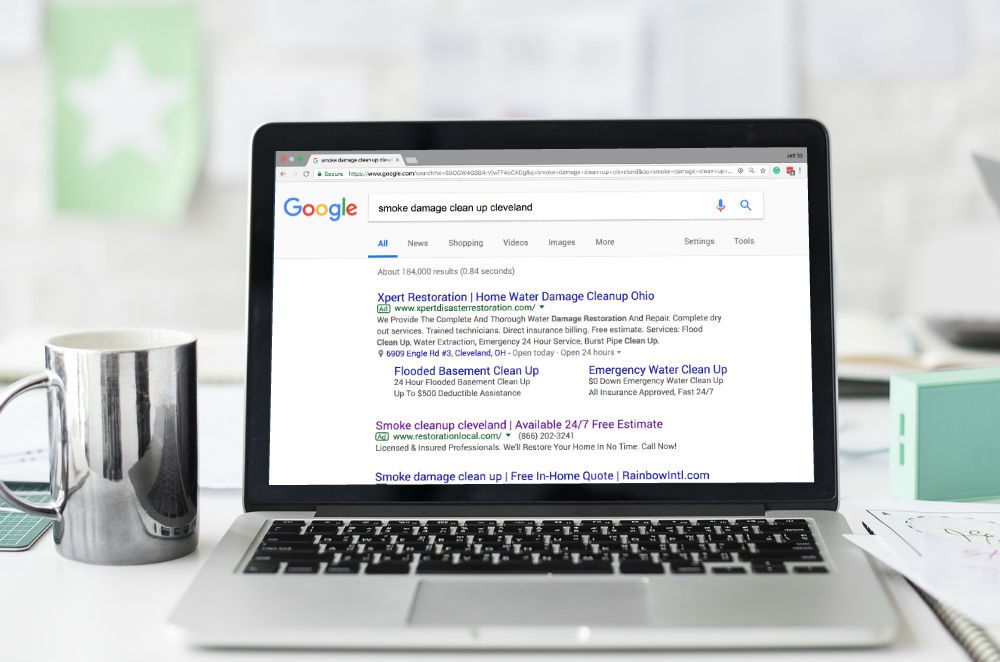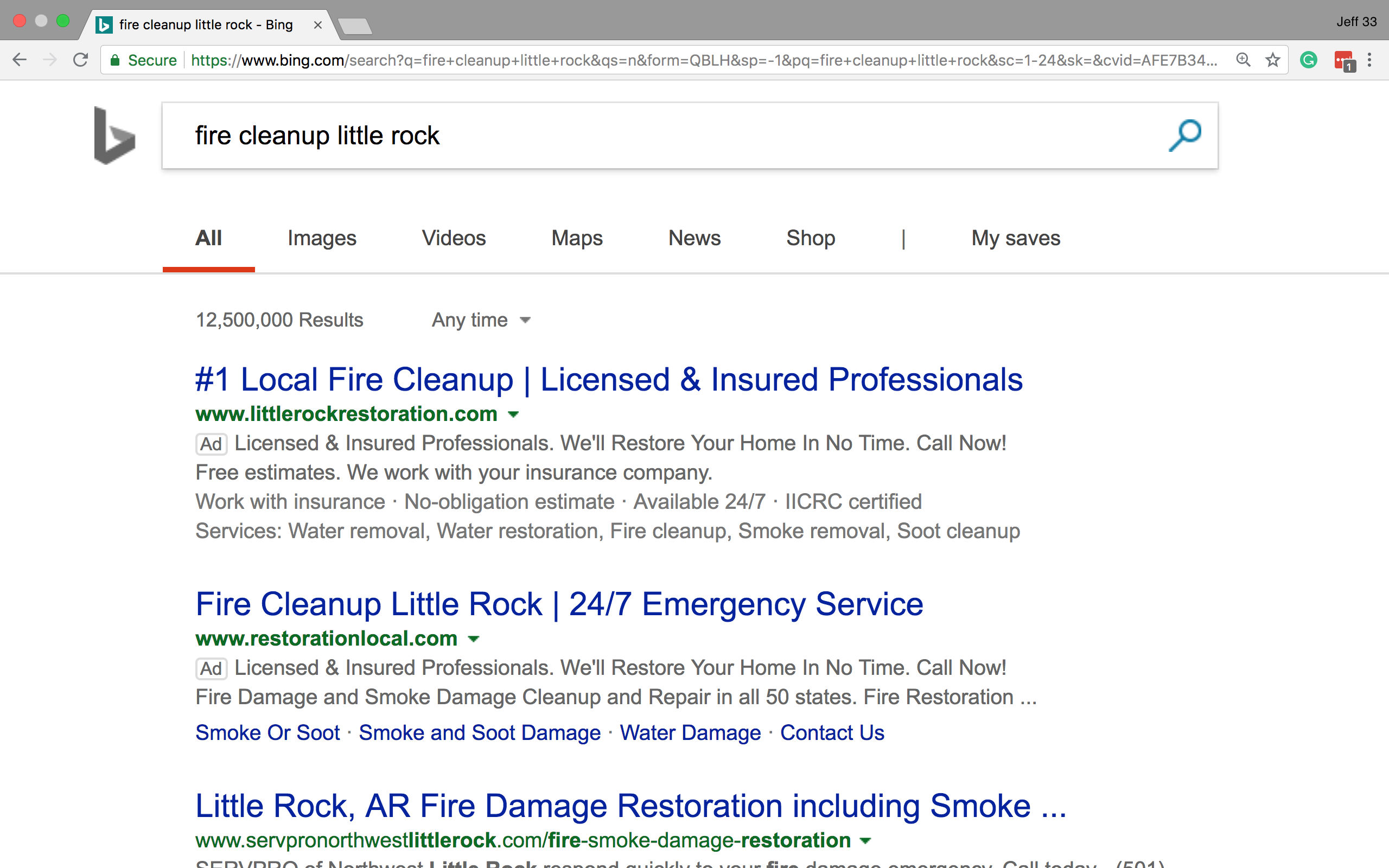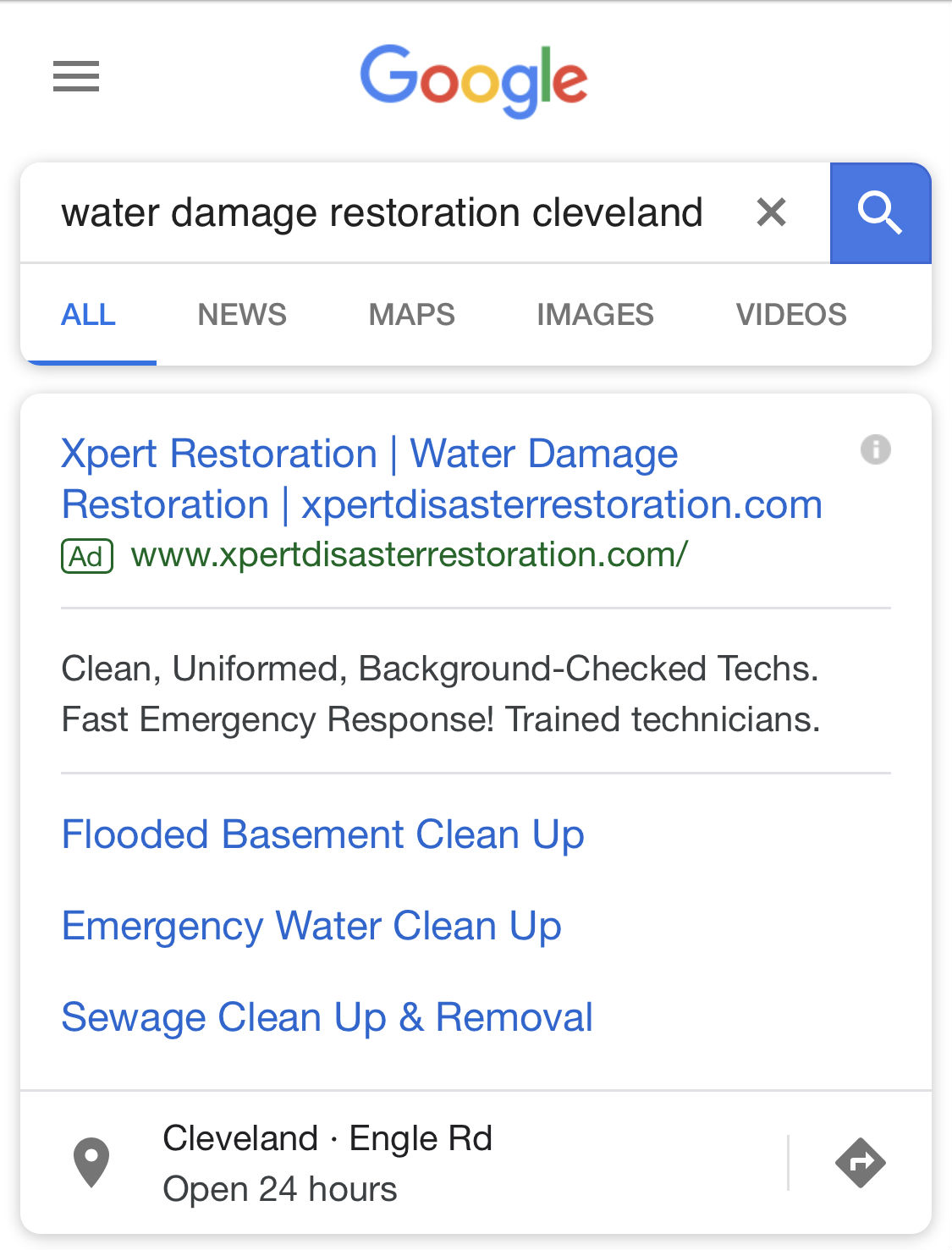Paid Search Basics for Contractors: The Basics to Generating Leads and Revenue with Pay Per Click Advertising

Paid search is a type of advertising where you create ads that target specific keywords on search engines like Google and Bing. Unlike other advertising methods, you only pay when a customer clicks on your ad. For this reason, paid search is often called pay per click (PPC) or cost per click (CPC).
With paid search, you target your customers based on the keywords or phrases they are searching for. Your text ads appear above the organic search results for those search terms and link to a landing page. On mobile devices, click to call ads allow customers to call you directly without visiting your landing page.
Why You Should Include Paid Search in Your Advertising Strategy
Unlike many other forms of advertising, paid search is usually intent based. Your customer has searched for specific terms with the intent of taking some action. For example, it’s likely a customer search for “drying out a flooded basement” needs water damage restoration services.
Another benefit of paid search advertising, you can start running ads for a very small investment. Each PPC campaign will have a daily budget and will automatically pause once you’ve spent a specific amount. You can also target specific days or times of day as well.
While other marketing and advertising methods take time to start working, paid search can start generating traffic almost immediately. Obviously, your success will vary, but it’s possible you could start getting clicks or calls as soon as you activate a campaign.
Not only is pay per click advertising fast, but it also allows you easily make adjustments to your ads. If a specific ad campaign isn’t performing, you can change keywords, edit the content, update the landing page, or increase how much you are willing to pay per click. If those changes don’t make a difference, you can shut off that individual campaign entirely.
The Challenge of Running an Effective Paid Search Strategy
Pay per click advertising is effective at generating leads, however, it’s important to understand that your cost per click is most likely a bid. Although flat-rate PPC does exist, you are bidding a certain dollar amount on that keyword or group of keywords in most cases. The more your bid on a specific keyword, the best ad position you will get. Other companies will be bidding on those keywords as well.
Publishers like Google and Bing will give you estimated bids for your keywords, but you – and your competitors – could decide to increase that bid just to get the first ad position. A bidding war can quickly spiral out of control, causing you to burn through your daily budget much faster and dramatically decreasing your return on ad spend.
Additionally, pay per click is not a set it and forget it advertising model. You need to check your campaign performance on a daily basis. Creating highly successful paid search campaigns will take time and constant adjustment.

Create Successful Cost Per Click Campaigns with Keyword Research
All paid search advertising is based on setting keywords designed to target your desired audience. The better your keywords, the more likely you are to reach customers in need of your services. While some keywords will be obvious, like “fire damage restoration,” others will require research.
Keyword research is one of the most important steps to launching any PPC campaign. You should identify individual keywords as well as long-tail keywords relevant to your restoration business. Your keywords may include general terms like “biohazard cleanup cleveland” as well as more specific terms like “crime scene blood cleanup parma”.
Google and Bing both offer a free keyword planner tools that estimate the search volume and cost per click of a given keyword. While these keyword planners will help you create effective pay per click campaigns, you will still need to test and update campaigns to reduce your cost per click and increase your ad position.
There are also a number of pay tools available to help you research keywords. Entering a keyword in these tools will generate a list of related keywords you may want to target, as well as estimate search volume and potentially average cost. Additionally, some tools will even allow you to get a list of keywords your competitors are using. While these tools are effective, remember to factor their cost into your return on ad spend.
Keep Your Paid Search Performing By Managing Your Campaigns
Once you’ve created your pay per click campaigns, you need to manage them regularly to keep them performing for you. You should be prepared to check your account on a daily basis to ensure you aren’t overspending or getting outbid.
Avoid making adjustments based solely on how much a campaign has spent. Just because you are spending more, doesn’t mean you are wasting money. The best way to measure the success of your campaigns is to tracking revenue. While you may be spending more on a given campaign, it could also generate more jobs and cash.
If a keyword isn’t performing, remove it from your campaign. Depending on the exact word, you may want to add it to your negative keywords to keep them from dragging down a quality campaign. In addition to reviewing and revising existing ads, continue to test new ad copy and landing pages.

Choosing the Right Search Engine for Your Pay Per Click Ads
Paid search advertising is about effectively targeting your audience. While Google and Bing are the biggest search engines, try several search engines to see which performs the best for you. Keep optimizing your campaigns and slowly remove campaigns and search engines that do not perform for you.
Google is the most used search engine and has one of the largest and most visible paid search advertising networks. Adwords, recently rebranded as Google Ads, is the defacto standard in paid search advertising.
Bing
Bing offers most of the same services as Google but has fewer searches overall. This equates to a much smaller audience. It does tend to be less expensive, so it may be a good addition or alternative to running ads on Google.
Other Search Engines
Aside from Google and Bing, there are a number of other search engines that offer paid search ads. Among them are Yahoo!, AOL.com, and DuckDuckGo. Although these search engines have a much smaller user base, they may still be worth testing for your area and desired audience.
Common Paid Search Terms Every Contractor Should Know
Ad Copy – The text of your advertisement. Ads differ by publisher, but typically the ad copy includes a headline and a description.
Ad Extensions – These are add-ons to some PPC ads, most commonly paid search ads. Ad extensions allow you to include additional text, website links, your address, and phone number. They increase the visibility to your ads, but also increase the cost.
Ad Position – Some ads, especially paid search ads, may have multiple units in a given space. Ad position refers to the specific placement of your ad on the page, with the first position being more valuable than the fourth position.
Broad Match – A paid search campaign setting that will display your ad if variations of your chosen keyword appears in the customer’s search. Broad match may be effective for some campaigns and not others.
Conversion – Sometimes referred to as goals, a conversion is a specific action you want your customer to complete. Common conversions are clicking a link, using a click to call on a mobile device, or filling out a form.
Conversion Rate – The number of conversions divided by the number of clicks your ad gets. Conversion rate is a common metric used to measure the success of a campaign.
Cost Per Click (CPC) – The amount you pay every time a customer clicks one of your ads. The CPC will vary by the keywords you are targeting or even by the day or time. CPC is often used interchangeably with paid search and pay per click (PPC).
Click-Through Rate (CTR) – Sometimes written as click-thru rate, it’s the number of clicks your ad receives divided by the total number of impressions. Click-through rate is a usually a key metric used to measure the success of a campaign.
Exact Match – A paid search campaign setting that requires the exact word or phrase to appear in the customer’s search. If the terms do not match exactly, your ad will not display.
Geo-targeting – Sometimes referred to as geofencing, is a way to limit your ads to only display within a specific geographic area. This ensures only customers in your service area see your ads.
Keywords – A specific search term you are targeting in a paid search campaign, such as “mold”.
Landing Page – Any page on a website that you are directing your audience to through your ads. This page should ideally be related to the search terms.
Long-Tail Keywords – A specific search phrase you are targeting in a paid search campaign, such as “water damage restoration cleveland”. Long tail keywords are sometimes referred to as key-phrases as well.
Negative Keywords – Also known as negative match, these prevent your ads from displaying when customers search for a certain keyword or phrase. For example, you may include “mold” or “biohazard” as negative keywords if you do not provide those services.
Organic Search Results – Results generated by a search engine based on the relevance of those web pages to the search terms. Paid search ads may appear above or below organic results.
Pay Per Click (PPC) – An internet advertising method where you only pay for an ad after a customer clicks on it. PPC is often used interchangeably with paid search and cost per click (CPC).
Pay Per Call – Similar to PPC, pay per call is an internet advertising method where you only pay for an ad after a customer calls you directly through the ad on their mobile device.
Quality Score – A quantitative analysis of your ads, based on your keywords and ad copy. The quality score helps search engines provide the most relevant ad results to their users.
Return on Ad Spend (ROAS) – Similar to return on investment (ROI), it measures the revenue generated per advertising dollar spent. ROAS is beneficial when comparing the effectiveness of different advertising methods.
Search Engine Results Page (SERP) – The page that includes the results of a search. SERPs include both paid and organic search results.
Search Terms – Also referred to as a search query, these are the words a user enters in a search engine.
Search Volume – The estimated number of searches for a given keyword over a period of time. While search volume can help you target relevant keywords for your business, it is only an estimate.
Keys to Successful Pay Per Click Advertising
1. Think Like Your Customers
While you are a restoration pro, your customers aren’t. Learn to think like your customers and target the keywords they are likely to enter.
2. Look At Your Competitors
Take a look at your competitor’s ads and the keywords they are targeting. Use that insight to improve your CPC campaigns and be more competitive.
3. Use Ad Extensions
Turning on ad extensions are proven to increase visibility and improve click-through rates. For contractors, the call extension is most effective, but test them all.
4. Keep Testing Your Ads
The key to success is testing and refining your keywords and campaigns. Don’t stop testing just because you found a winning combination – it isn’t guaranteed to last.
5. Measure Your Results
Track how much you spend to get each job and the revenue those jobs bring in. Use tracking numbers or ask the customer how they found your business to determine the source.
Paid Search is Here to Stay
Paid search has become one of the fundamental advertising methods today and you can no longer afford to ignore it. While you can launch your first CPC campaign in just minutes, it takes time and effort to effectively manage your PPC advertising strategy.
Being successful takes persistence and perseverance, so keep testing different ad copy, landing pages, keywords, and search engines. Instead of counting clicks, measure your conversion rate and the return on ad spend to determine which campaigns are performing. With the right strategy, pay per click advertising will generate more restoration jobs for your business.
If you aren’t ready to launch your own paid search strategy, our exclusive lead generation system will help you get more jobs. We send each lead exclusively to one partner and only bill you on valid leads. Learn more about our water damage, fire restoration, mold remediation, plumbing, biohazard cleanup, and carpet cleaning leads or call 1-888-594-8381 for more details.
